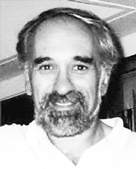Sontag Honored in San Diego with SIAM's Reid Prize
July 10, 2001

Eduardo Sontag, the fifth recipient of SIAM's Reid Prize, was recognized for his contributions to nonlinear control theory.
Putting Sontag's work in context, Petar Kokotovic of the University of California, Santa Barbara, explains that just as the linear control theory of the 1960s and 70s was dominated by concepts and language introduced by Rudolf Kalman (Sontag's thesis adviser at the University of Florida), much applicable nonlinear control theory from the 1980s to the present day has been built on foundations laid by Sontag and his co-workers.
In addition to his work on the theoretical foundations of control theory, Sontag has developed new approaches to the analysis and design of control systems. "It is rare," Kokotovic says, "that a mathematician is so fully attuned to problems of interest to engineers."
Sontag lists his current research interests as control design, including Lyapunov-based techniques and disturbances; computational complexity; hybrid systems; and mathematical problems arising in biology. In the rapidly growing area of hybrid control, Kokotovic points out that Sontag was one of the first to recognize the potential of the combination of continuous-variable techniques with tools from discrete mathematics and computer science for the development of a comprehensive approach to the regulation of nonlinear systems. Considering computational complexity in control in a 1988 paper, Sontag showed that the problem of testing for nonlinear controllability is NP-hard. Such a fundamental limitation was not expected at that time; indeed, no one had even thought of formulating the question in those terms.
Also among Sontag's significant contributions is a series of papers on input-output properties of nonlinear systems. His unifying framework encompasses several of his new concepts: control Lyapunov functions, input-to-state stability, and input-output stability among them. The acronyms for these and other notions-CLF, ISS and IISS, IOS and IOSS-"are becoming ubiquitous on the pages of prestigious journals," Kokotovic says. "They are the most convincing 'citation index' of the far-reaching impact of Sontag's work."
The Reid Prize fund was established with a generous gift from Mrs. Reid; the prize was awarded for the first time in 1994, to Wendell Fleming; subsequent recipients have been Roger Brockett (1996), Jacques-Louis Lions (1998), and Constantine Dafermos (2000). With the death of Mrs. Reid on January 1, 2000, the awarding of the prize, consisting of a medal and $10,000, became an annual event.
For future nominations, John Burns, who chairs the prize committee, reminds the community that the Reid Prize is very broad, recognizing work in all areas of differential equations (including numerics and applications) as well as in control and related areas.
Look for reports on the other SIAM prizes awarded at the 2001 SIAM Annual Meeting and the SIAM Conference on Control and its Applications in future issues of SIAM News.

